Before the main topic, please allow Dr.Zhu to introduce the latest medical cases.
Case One: A couple had been trying to conceive for six months without success, so they visited Dr.Zhu's clinic. Western medical examinations showed no organic problems with either partner (both sperm and eggs were fine), but because they were not young anymore, both were feeling nervous and anxious. After diagnosing through Traditional Chinese Medicine (TCM), Dr.Zhu concluded that the woman had insufficient liver blood due to work-related reasons, and the man had a deficiency of spleen and kidney yang due to his weight. With the help of Chinese herbs and special acupuncture treatments for fertility, the couple successfully conceived after just two cycles. Of course, both partners were very cooperative with the treatment and the results were evident. Dr.Zhu reminds all prospective parents that if natural conception has not been successful after six months, it's advisable to check all fertility indicators. In some cases, even though both partners are fine, they may still have difficulty conceiving. In such situations, they might consider trying Dr. Zhu's TCM fertility treatments, which include acupuncture and Chinese herbs.
Case two: A girl experienced sudden eczema for two days, with very obvious red rashes on her face, hands, and feet. The rashes were erosive, exudative, accompanied by itching, and she had poor sleep, constantly scratching. She had taken Western anti-allergic medication orally and applied topical anti-pruritic ointments, but the effects were not good. The girl was looking forward to participating in a school-organized outing in a week and did not want to miss it. After a careful physical examination, Dr. Zhu concluded that the patient's main issue was spleen deficiency and retention of dampness. Therefore, he decided to use a combination of traditional Chinese medicine and acupuncture, to strengthen the spleen and eliminate dampness, and to relieve itching by dispersing wind. After just one week of treatment, the effects were significant, and she was able to go on the outing as planned.
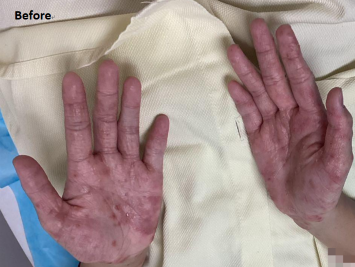
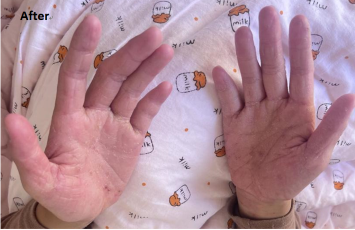
( Some pictures are from the Internet. If there is any infringement, please contact us to delete ,Thank you.)
Getting back to the topic, what exactly is eczema, can it be contagious, and are there any triggers?
Eczema, also known as atopic dermatitis,is a chronic and recurrent inflammatory skin disease characterized by intense itching, symmetrical distribution, and eczematous lesions. It commonly affects children and women and is not contagious.
Eczema symptoms manifest as itchy, rough, and dry skin. As the condition worsens, eczema symptoms include redness, inflammation, and itchy rashes on the skin, which may also form scaly and fluid-filled blisters. These blisters can eventually ooze and then crust over.
Modern medicine believes that the causes of eczema are often the result of the interaction of various external and internal factors. Common external factors include fish, shrimp, pollen, dust mites, animal fur, dander, cosmetics, soap, and synthetic fibers. Internal factors include chronic infection sites, dysfunction of the digestive system, endocrine and metabolic changes, circulatory disorders, as well as mental stress, emotional excitement, depression, and overwork. Eczema is not a hereditary disease, but it often has a certain familial tendency, which may be related to an allergic constitution.
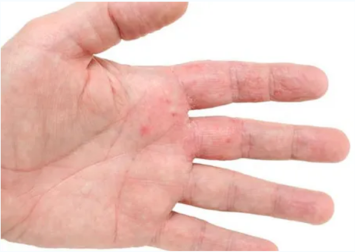
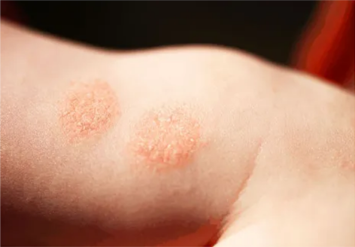
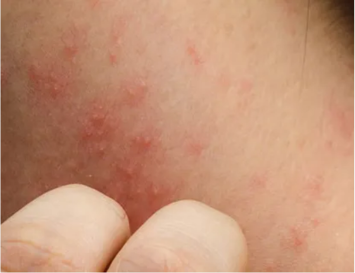
( Some pictures are from the Internet. If there is any infringement, please contact us to delete ,Thank you.)
What is eczema from the perspective of Traditional Chinese Medicine?
In Traditional Chinese Medicine, eczema is referred to as "milk rash," "congenital sores," "four corner wind," "damp sores," and other terms. TCM attributes the causes of eczema to a constitutional intolerance, as well as imbalances in diet and lifestyle; over-consumption of foods that provoke wind and heat, greasy and spicy foods, strong tea, alcohol, and other stimulants that harm the spleen and stomach; leading to the production of dampness and phlegm. This results in the spleen being overwhelmed by dampness, causing water and phlegm to stagnate. External factors such as getting caught in the rain, wading through water, or lying on damp ground for extended periods can lead to a battle between internal and external dampness, which over time turns into heat. The accumulation of dampness and heat congests the skin and tissues leading to the onset of the disease. Acute eczema presents with more heat than dampness, while chronic eczema typically shows more dampness than heat. Prolonged stagnation of dampness can also transform into dryness and damage yin, leading to spleen deficiency and blood dryness.
How to prevent eczema?
1.Keep your mouth under control
Foods that eczema patients should avoid eating
1. Spicy and irritating foods: such as chili, ginger, garlic, pepper, etc., these foods can easily irritate the skin and worsen eczema symptoms.
2. Fatty and greasy foods: such as fried chicken, barbecue, hot pot, etc. These foods can easily lead to the accumulation of dampness and heat in the body, which is not conducive to the recovery of eczema.
3. Seafood allergens: such as shrimp, crab, fish, shellfish, etc., these foods can easily cause allergic reactions and worsen eczema conditions.
4. Sweet and high-sugar foods: such as chocolate, candy, cake, etc., these foods can easily lead to internal dampness and heat accumulation, affecting the spleen and stomach functions.
5. Alcoholic and stimulant beverages: such as liquor, beer, coffee, strong tea, etc., these drinks can easily stimulate the skin and worsen the symptoms of eczema.
2. Pay attention to environmental and personal hygiene.
Regularly wash and air bedding to avoid using carpets and plush toys. Ensure good indoor air circulation, at least half an hour daily, and maintain indoor humidity between 50% and 60%. Families with pets should pay attention to the cleanliness and grooming of their animals. Those with known or suspected allergies to animal dander should avoid contact with animals.
Avoid excessive skin cleansing and try to minimize the use of
soaps and other alkaline hygiene products. The water temperature for bathing should be between 32 and 38°C, with a duration of 5 to 10 minutes.
Is there any effect of taking Chinese medicine orally for treating eczema?
Dr.Zhu primarily uses principles of clearing heat, strengthening the spleen, removing dampness, and dispelling wind in clinical practice, selecting oral Chinese patent medicines that match the symptoms for different syndromes.
1.Wind-heat and dampness syndrome: Commonly seen in acute eczema and during acute exacerbation periods of chronic eczema. The course of the disease is short, with rapid progression, and the rash is mostly red papules without obvious exudation, accompanied by severe itching, a burning sensation in the affected skin, or thirst, with a slightly red tongue, thin yellow coating, floating and rapid pulse, and purple fingerprints. The treatment principle is to disperse wind, clear heat, and resolve dampness to stop itching.
2.Damp-heat invasion syndrome: Local papules or vesicles with redness of the skin lesions, intense itching, a sensation of burning, visible exudation and erosion. Accompanied by systemic symptoms such as thirst, restlessness, yellow urine, and sticky stools, with a red tongue, yellow and greasy coating, a slippery and rapid pulse, and purple finger prints. Treatment aims to clear heat and dry dampness, dispel wind and relieve itching.
3.Spleen deficiency with dampness accumulation syndrome: Subacute eczema is commonly seen. Local skin lesions may present with papules or vesicles, with a darker skin tone, scales, less exudation, obvious itching, poor appetite, fatigue, abdominal distension, loose stools, a bluish color at the root of the nose, a yellow complexion, a pale and swollen tongue with tooth marks on the edges, a white and greasy coating, a slippery pulse, and a reddish fingerprint. The treatment focuses on strengthening the spleen to promote diuresis and dispel wind to relieve itching.
4.Blood deficiency with wind-dryness syndrome: Commonly seen in chronic eczema. The local skin is rough and thickened, with a darker complexion, visible pigmentation, mild itching, and systemic symptoms such as dry mouth without the desire to drink. The tongue is pale with a white coating, the pulse is thin, and the fingerprints are reddish. Treatment focuses on nourishing blood, moisturizing dryness, dispelling wind, and relieving itching.
The above methods have been clinically verified to be effective repeatedly.
Of course, some herbal medicines may be bitter, which can be difficult for children to swallow. Dr. Zhu has pediatric-specific Chinese patent medicine granules, which include sweeteners to neutralize the bitterness. Children who have taken them have been able to accept them.
Does acupuncture treatment have an effect on eczema?
Acupuncture has very good therapeutic effects in relieving itching. Dr. Zhu usually selects points on the lung meridian, large intestine meridian, and spleen meridian, such as Quchi, Xuehai, Zusanli, etc.
Considering that children of different ages have different levels of acceptance towards acupuncture, Dr. Zhu also adopts a treatment plan that varies by age group: children under 3 years old can choose Tuina (Chinese massage), tonifying the kidney meridian, and taking blood from the Xuehai point, with a treatment time of about 20 minutes, and operations are performed 2 to 3 times a week; children aged 3 to 7 years old have needles retained for 10 to 15 minutes, and children over 7 years old have needles retained for 20 to 30 minutes, with operations performed 2 to 3 times a week.
Is bloodletting therapy and fire needle therapy effective?
Yes, bloodletting and fire needle therapy can clear heat, dispel dampness, and relieve itching, but they are generally used for severe eczema and adult patients. Dr. Zhu mainly targets special acupoints on the fingers and areas with more local skin lesions, with specific operations varying from person to person.
What are Dr. Zhu's insights on treating eczema?
Doctor Zhu's principle in treating eczema is to allow the pathogenic factors to find an outlet. When the internal pathogen is addressed, it should be expelled outward. If the outward expulsion fails, the pathogen will sink deeper inside. In treating eczema, one must guide the treatment according to the condition; if the dampness is in the lower energizer, it should be drained, and if it is on the surface, it should be expelled. If the dampness sinks from the qi level into the blood level, recurrence is likely. Therefore, patients and their families should be mentally prepared for the potential "fluctuations" when expelling the pathogen. However, if left untreated, allowing eczema to become chronic, the difficulty of treatment will increase.
For chronic eczema, Doctor Zhu primarily explores the reasons for the recurrence of the condition from the patient's environmental factors, intervenes, and also considers the patient's family factors and dietary taboos. (Case study see link).
Due to space limitations, it is not possible to cover all the details of treating eczema, such as what foods eczema patients can eat, different treatment strategies for children and adults with eczema, whether fire acupuncture can be used for facial eczema, whether ear acupuncture is applicable, and whether cupping is effective... If you have related questions, you can consult Dr. Zhu's clinic. Dr. Zhu will provide each eczema patient with a professional and useful plan. Contact information for Dr. Zhu is as follows:
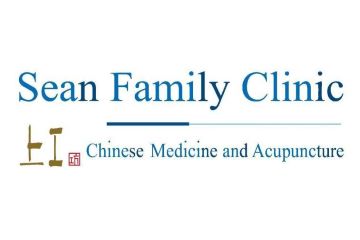
Address: Suite 5, 143-147 Somerville Boulevard, Winthrop WA 6150
Website: www.seanfamilyclinic.com
(08) 62690917 / mobile:0432917382
Hours: 9:00-18:00
Monday-Sunday
9AM-6PM
Wechat:
